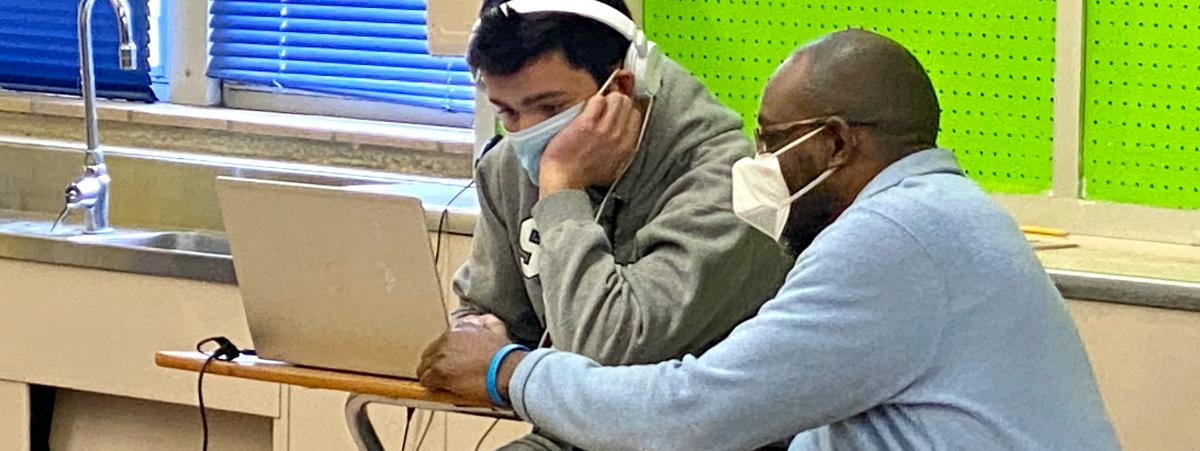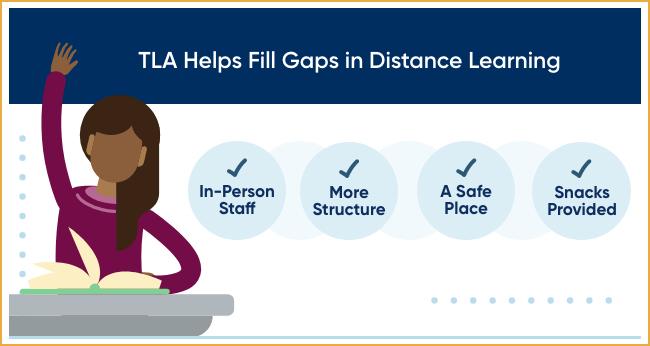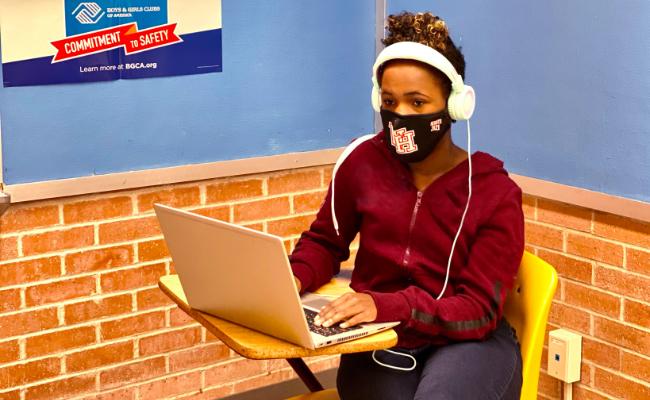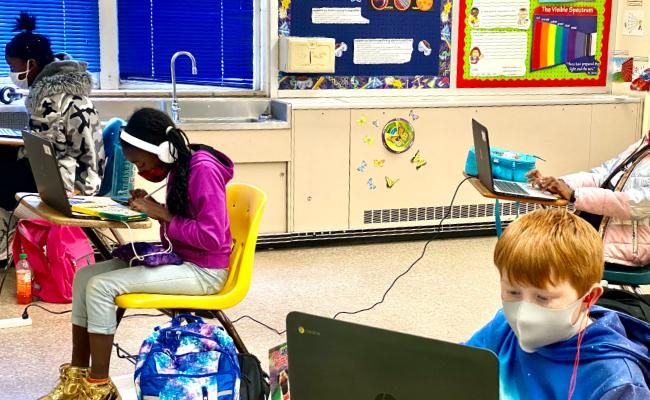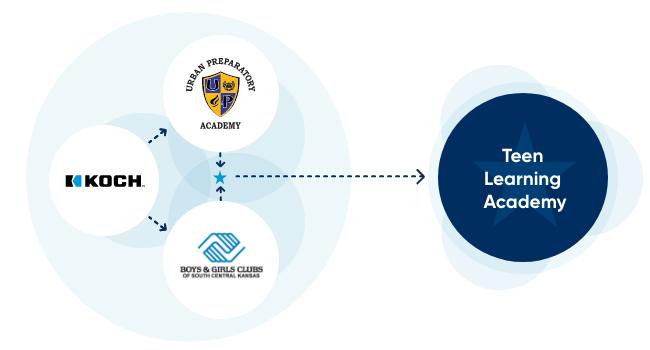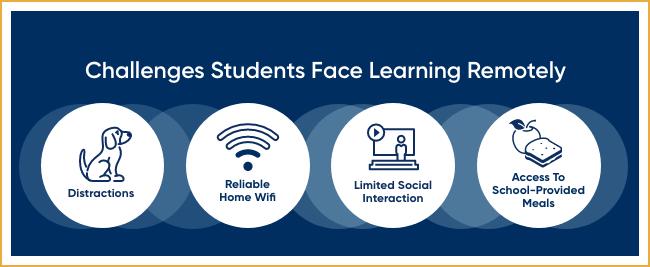Going the Distance: Unique Collaboration Makes Remote Learning More Successful for Wichita Teens
Renee, a high school senior in Wichita, Kansas, struggled when classes went virtual last March. Being out of the classroom and cut off from teachers made it difficult to learn, so she was frustrated when Wichita Heights High School announced it would remain remote this fall.
Renee wasn’t alone. Thousands of students in the Wichita area were challenged with these unprecedented changes this year. Some had slow Wi-Fi or struggled to learn without in-person help from teachers. Others were distracted being at home, and still others were going hungry because they depended on the school for meals. Many simply hated being isolated and missed regular social interaction with their peers.
All summer, the Boys & Girls Clubs of South Central Kansas (BGC) had been fielding calls from parents saying the same thing — and looking for help. Once schools announced they would continue distance learning for the fall semester, the phones started ringing off the hook.
“Parents were asking us if we could provide a space for the students, because they wanted to ensure these kids had a safe and productive environment to attend classes,” said Junnae Campbell, CEO of BGC.
The idea of setting up a location for students to attend remote classes had been percolating for months among the BGC staff and board. But space constraints to meet CDC guidelines for social distancing meant the number of students the BGC could handle for virtual classes was severely limited.
“We’d been talking about it, and my team kept saying, if only we had the space, then we could serve more kids and give them a better, safer experience,” Junnae said.
The solution came in the form of unused classrooms at a local private school. Bishop Wade Moore, Jr., founder and dean of the Urban Preparatory Academy, saw his students and congregants grappling with the same issues. After church services one day last spring, he asked a freshman how distance learning was going. She broke down crying.
“She told me she wasn’t able to learn like that,” he said. “Her mom, too, being a single mom, was upset she had to leave her 14-year-old daughter home alone all day while she went back to work.”
Bishop Moore knew he could help those students, but he was hoping to cast a wider net to catch more kids in need of assistance. To do that, he needed space, teachers, supplies, food and a host of other amenities. He started with the unused classrooms in his school. “I remodeled all those classrooms — new carpet, new paint, got Wi-Fi throughout the facility,” Bishop Moore said. “I wanted to have a place where we could hold classes for students in the neighborhood, because I knew something needed to be done to get in-person school going.”
Bishop Moore finished upgrading the classrooms just in time for a serendipitous email from Amy Johnson, community affairs manager at Koch Industries in Wichita. Amy is a BGC board member, who had worked previously with Bishop Moore. When he learned BGC needed space, he offered them a tour of the newly remodeled classrooms.
Amy became the link connecting the two nonprofit organizations. For her, it was a no-brainer to match them. “It is such a powerful illustration of why our vision, and the concepts of mutual benefit and fulfillment, are spot on,” she said.
It took just eight days for Junnae and her BGC team to progress from touring the proposed space to welcoming students at its newly-christened Teen Learning Academy (TLA). The vision was for students to spend the day attending remote classes, then transition directly to their BGC after-school activities. Of course, it wasn’t quite as simple as throwing open the doors to the newly refurbished classrooms. There were a host of tasks to be completed, including arranging for snacks and dinners, ensuring the classrooms had sufficient supplies – including personal protective equipment for students and staff – and arranging the rooms and desks to meet CDC guidelines.
“I thought, oh my goodness, how can this happen?” Bishop Moore said. “How can I get my facility together this weekend? But we managed it. I wanted to see students in the facility, and know they are learning in that space.”
TLA currently has 56 students enrolled and plans to grow to roughly 115 as soon as BGC can hire enough staff. There’s already a waiting list of students wanting to join.
Response from students and parents has been universally positive. One high school student had been responsible for herself and her younger sister from March through May. Both of them had trouble with their schoolwork all spring. But at TLA this fall, things have been completely different.
“TLA provides more structure for a student's day,” Bishop Moore said. “Boys & Girls Clubs staff are there to help. It may be technology challenges, it may be helping with a math problem. Having that staff person, plus limited distractions, has given these students a much better environment for learning.”
That environment depends heavily on Koch’s partnership. As a founding funder of TLA, Koch’s $50,000 grant covers general operating expenses, including rent, staff and meals, but even more important, it’s kept the cost for TLA at just $30 per student. That includes classroom time from 7:30 a.m. to 3 p.m. and BGC after-school activities until 6 p.m., as well as snacks and dinners. TLA’s success is in part the result of Koch giving employees the encouragement and support necessary to look for ways to transform lives — theirs and those around them, Amy said. “When you have the opportunity to do something you’re passionate about and the privilege to connect others and resources, it gives you a new lens for identifying partnerships and opportunities,” she said. “That makes Koch so unique.”
“We’ve created a learning partnership, with the Boys & Girls Clubs, Urban Prep and Koch,” Junnae said. “This shows that communities can come together, especially during this time, and help each other. Together, we’re making sure that even in these unsettled times, kids have a safe space for their educational journey.”
Bishop Moore agrees. “This is our first opportunity to work with another group that Koch is funding,” he said. “By working together and remembering that the kids are the main thing, together we’ve all created a true virtuous cycle.”

